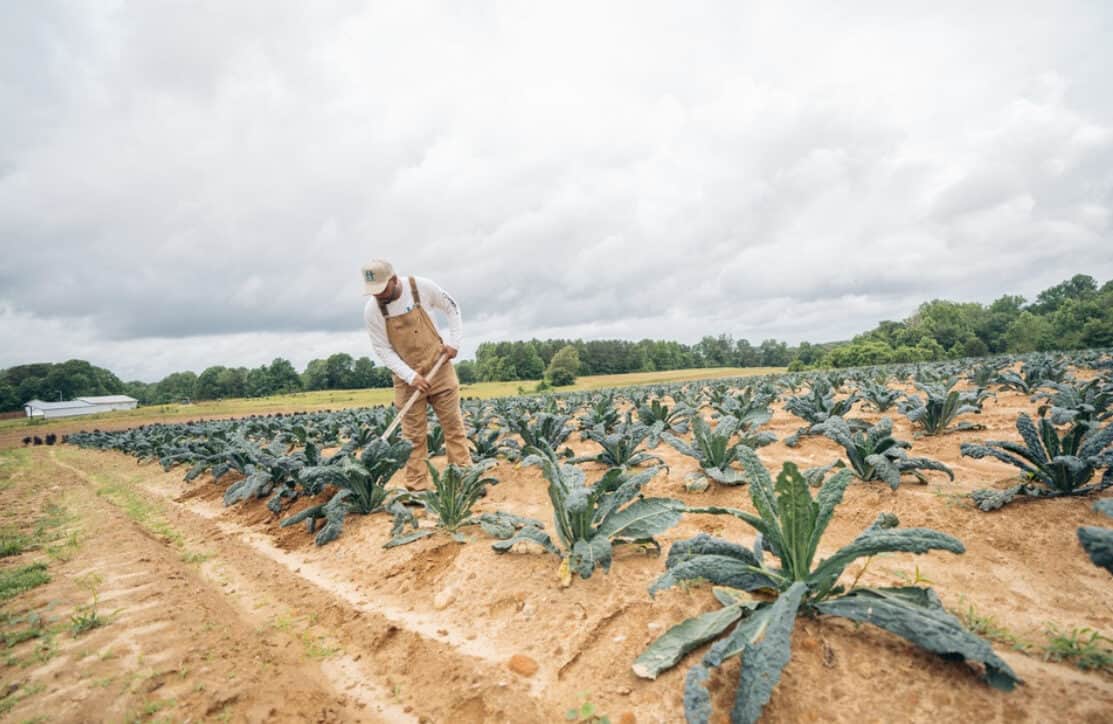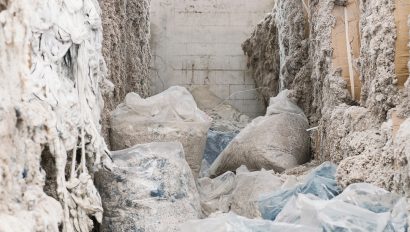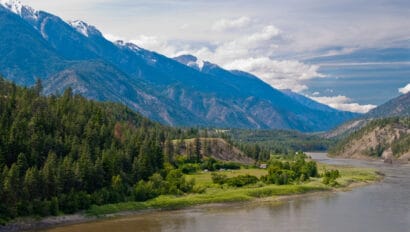Growing Hemp on Reclaimed Land with Browns Family Farm in North Carolina

On the Ground is a short interview series that puts the voices of farmers, producers, and suppliers at the forefront of conversations about responsible materials production.
The interviews are hosted by La Rhea Pepper, Textile Exchange’s Co-Founder and Catalyst. As a fifth-generation organic cotton farmer from West Texas, La Rhea holds a strong personal connection to the land, and has seen first-hand the environmental impacts of growing fibers and materials.
In this first episode, La Rhea speaks with Patrick Brown, a fourth-generation farmer in North Carolina from Brown Family Farms. His farm can be traced back to his great-grandfather, who became a sharecropper there after escaping slavery. Patrick’s grandfather then gained ownership of the land, and his family still owns a portion of it to this day.
Audio
Listen to the interview
Patrick speaks about how he has added industrial hemp to his portfolio, and is focusing on limiting synthetic inputs to the land as well as increasing soil conservation practices. He also founded Connect Group LLC which advocates for the inclusion of minority farm ownership in agricultural legislation.

La Rhea: We’d love to hear a little bit about the history of your farm, your roots, and the journey to where you are today with your family farm.
Patrick: We’re about 20 miles away from the original location where my great grandfather, Byron Brown, who was the first-generation farmer, was a slave, and after being enslaved, became a sharecropper. After the time of sharecropping up until his death in 1831, my grandfather Grover Brown, utilized the land that he sharecropped and gained ownership of it. It is the land that my father, the third-generation farmer, farmed and it is where we farm today as the fourth generation.
We were born and raised on tobacco crops, those were our cash crop programs. That is what clothed us and fed us. And basically where I learned hard work in agriculture. After my father’s retirement is when I looked into pesticide-free, herbicide-free programs and incorporating industrial hemp fiber, textile grade, into our farming portfolio to be a diversified crop to help with soil improvements as well as fertility.
We’re about 20 miles away from the original location where my great grandfather, Byron Brown, who was the first-generation farmer, was a slave, and after being enslaved, became a sharecropper.
La Rhea: What led you to looking at hemp as an opportunity and what was your learning curve there?
Patrick: When I first started growing hemp, it was more focused on the medicinal side of retail market [industrial hemp CBD] because the woven and non-woven fiber market that we wanted to grow for was inexistent. I was licensed in the state of North Carolina under the Industrial Hemp Pilot program. North Carolina is a $9 billion agricultural state, so it produces a lot of income, that GDP growth, for the state.
Now, we want to try to make industrial hemp one of those crops that the farmer can benefit from as well as the state. We knew what the crop could do to the land. And that’s also what we focused on, using less and less fertilization from synthetic processes.
One of my key agronomy avenues to incorporate industrial hemp fiber or medicinal industrial hemp into our diversified crop portfolio is to help lower the cost of inputs. Our land had been of use of pesticides and herbicides for so many years and it was my duty as the fourth-generation steward to try to revamp that process of our land. So, we focused on adding that crop into a rotational opportunity for our crops to be diversified. About 80% of my crop rotation is now industrial hemp. That is what we now consider our cash crop.
La Rhea: Well, that certainly keeps you busy, doesn’t it?
Patrick: Absolutely. We’re setting our farm up for future generations. My nephews now work with me on the farm, and they are fifth-generation land stewards. We’re just teaching them the principles of how to maintain this process for generations to come.
My nephews now work with me on the farm, and they are fifth-generation land stewards. We’re just teaching them the principles of how to maintain this process for generations to come.
La Rhea: We talked about you being in Washington D.C. and having a voice in the upcoming Farm Bill. What are you doing and what do you feel like your leadership is taking you to do?
Patrick: Part of the company that I founded in 2013, the Connect Group LLC, is to focus on advocacy work and the inclusion of minority farm ownership. Currently we have lost so many acres of minority-owned land in North Carolina, and we want to make sure that we advocate for those landowners and future farmers of America.
We meet with our legislators to focus on – when bills are created – that inclusivity of minorities are included in those bills so that we can create land structure and viability for future farmers of America, especially the BIPOC-led organizations. It is very important to me to include advocacy in my agriculture setting and background.
La Rhea: What would you like to see as far as the future of hemp in the United States?
Patrick: Education. Appropriate education on the plant to understand what the value of the crop can bring to the infrastructure of the United States and where it is in greenhouse gas improvements, climate change impact, and carbon sequestration. Those things are how we can help the environment for future generations. We’re not here to take away from the forestry industry. We’re here to add to the forestry industry. We’re not here to take away from the cotton industry. We’re here to add to the cotton industry, making the United States manufacturing as strong as it was in the sixties and seventies.
We’re here to add to the cotton industry, making the United States manufacturing as strong as it was in the sixties and seventies.
La Rhea: Amazing. So, again, stepping back, what is your vision for the future of Browns family farms and your dreams and hopes for next generations?
Patrick: My vision for Brown Family Farms is to add jobs to my county and have our own inclusive manufacturing facility that can possibly cater to the over 25,000 end products of hemp. We also want to create a space where young boys and girls can come learn agriculture, agronomy, horticulture by creating ways to offset the food insecurity that is currently happening in the United States. We want to teach students a vocational side of agriculture so they can learn to be self-sustainable and be able to start small farms at their home in the countryside.
La Rhea: It’s so interesting to think about how we lay that future for our farmers and the ripple effect. We not only have the Climate+ goal of reducing greenhouse gases, but it’s also about how we make sure that rural communities are thriving and resilient and have diversity of crops and again, addressing food security and making sure there are opportunities for future generations. You are right in the center of what we want to see and a great example to inspire us all.
So one last question as we bring our chat to a close. When you think about catalyzing action, what is your call to action? What is the one thing that you would ask our community?
Patrick: My call to action as a farmer is to take a chance on including industrial hemp fiber. We have a lot of cotton gins in the state of North Carolina that are going out of business, and those cotton gins can be transitioned into hemp processing warehouses. There are not enough organic cotton farmers in the United States. And so I feel that this would be a way to increase that organic cotton production by also double cropping industrial hemp after cotton has been harvested. That gives farmers another potential cash market for their farm. And it also helps the land and the regeneration process. So that would be my call to action: give hemp the chance to be able to be useful.


